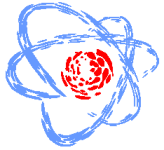Speaker
Mr
Jargalan Narmandakh
(Institute of Physics and Technology, Mongolian Academy of Sciences, Ulaanbaatar, Mongolia)
Description
Fullerene and fullerene-like nanostructures are played the main role in various research areas. Especially the investigations of fullerene C60 and C70 have grown up intensively due to their unique properties [1, 2]. A several interesting effects, such as cluster formation, solvatochromic effects and nonlinear dissolution properties etc., are investigated for fullerenes solutions by different methods [4-6]. The kinetics of dissolution and cluster formations of fullerene in different solutions are investigated by various instruments. One of the most convenient method is small angle neutron scattering for fullerene solutions. The investigation of cluster size determination of fullerene C70 in CS2 solvents are performed at the YuMO instrument of the IBR-2 reactor. The value of the gyration radius (Rg) is evaluated from SANS to be in the range of 3.32-5.56 Å, depending on sample preparation procedure. In general, the obtained Rg values are considered to be in close agreement with similar experimental results [7] and theoretical estimates. The kinetics of dissolutions for fullerene solutions weren’t completely explained so far. In our previous work [6], the kinetics of dissolution were investigated for fullerene in non-polar and low polar solvents. The present work, we investigated kinetics of dissolution processes for C60/NMP solutions with various concentrations by UV-Vis spectrometry. We model the kinetics of simultaneously occurring processes in the solution via a system of simple kinetic equations and obtain the corresponding parameters dependence on preparation conditions. The obtained results will allow one in the future to take account of these effects while modeling the kinetics of slow growth of large clusters in C60/NMP solutions. REFERENCES [1]. Beck M.T., Mandi, G., Fullerene Sci. and Technol., (1997), 5(2), 291-310. [2]. Avdeev, M.V., Khokhryakov, A.A., Tropin, T.V., Andrievsky G.V., et al., Langmuir, (2004), 20, 4363–4368. [3]. Andrievsky, G.V., Klochkov, V.K., Karyakina, E.L., Mchedlov-Petrossyan, N.O., Chem. Phys. Lett., (1999), 300, 392-396. [4]. Kyzyma, O.A., Korobov, M.V., Avdeev, M.V., Garamus, V.M., Petrenko, V.I., Aksenov, V.L., Bulavin, L.A., Fullerenes, Nanotubes and Carbon Nanostructures, (2010), 18, 458-461. [5]. Tropin, T. V., Jargalan, N., Avdeev, M. V., Kyzyma, O. A., Sangaa, D., Aksenov, V. L., Physics of the Solid State, (2014), 56, 148-151. [6]. Jargalan, N., Tropin, T. V., Avdeev, M. V., Aksenov, V. L., Journal of Surface Investigation: X-ray, Synchrotron and Neutron Techniques, (2015), 1, 16-20. [7]. Affholter, K.A., Henderson, S.J., Wignall, et al., J. Chem. Phys., (1993), 99: 9224.

